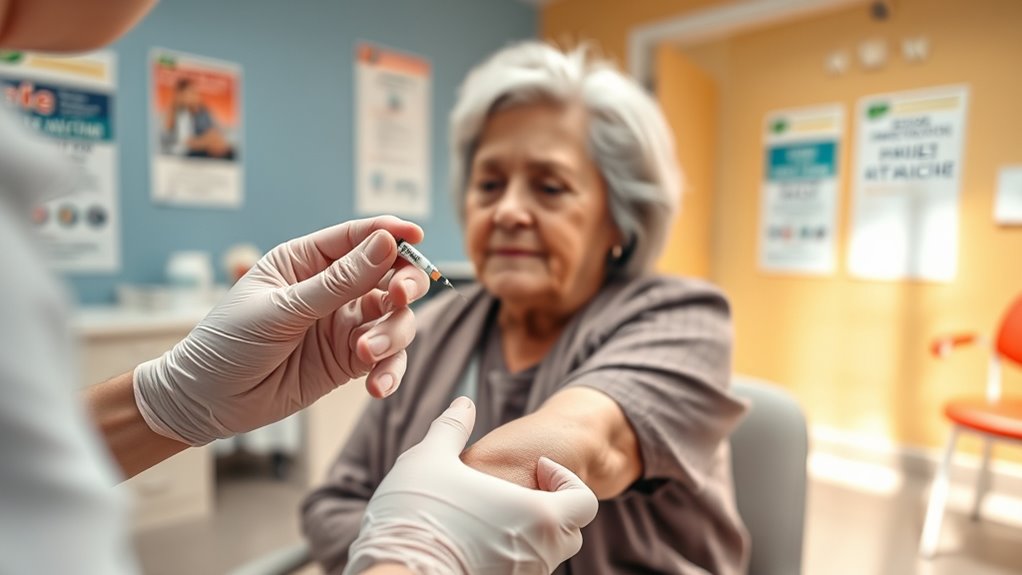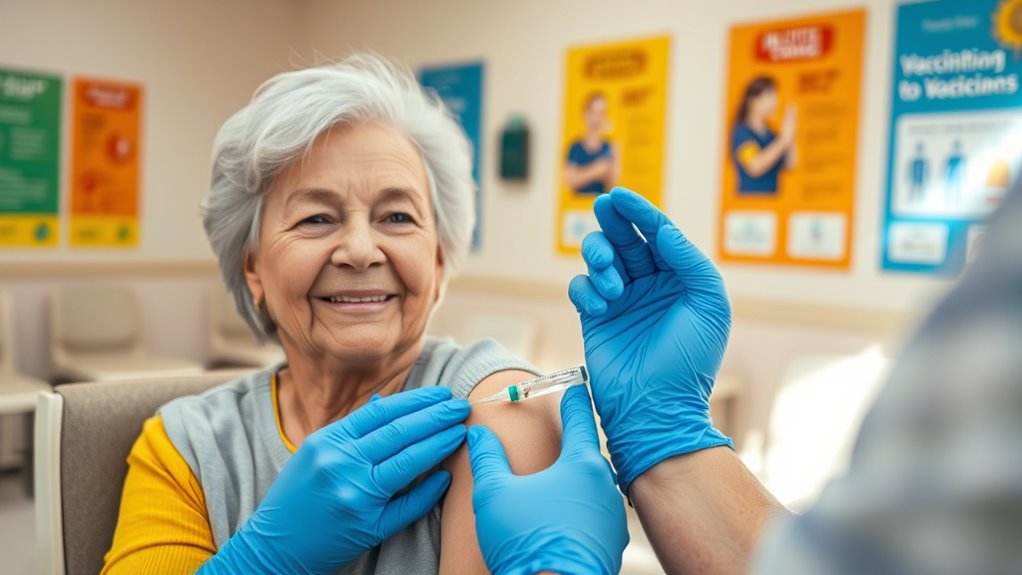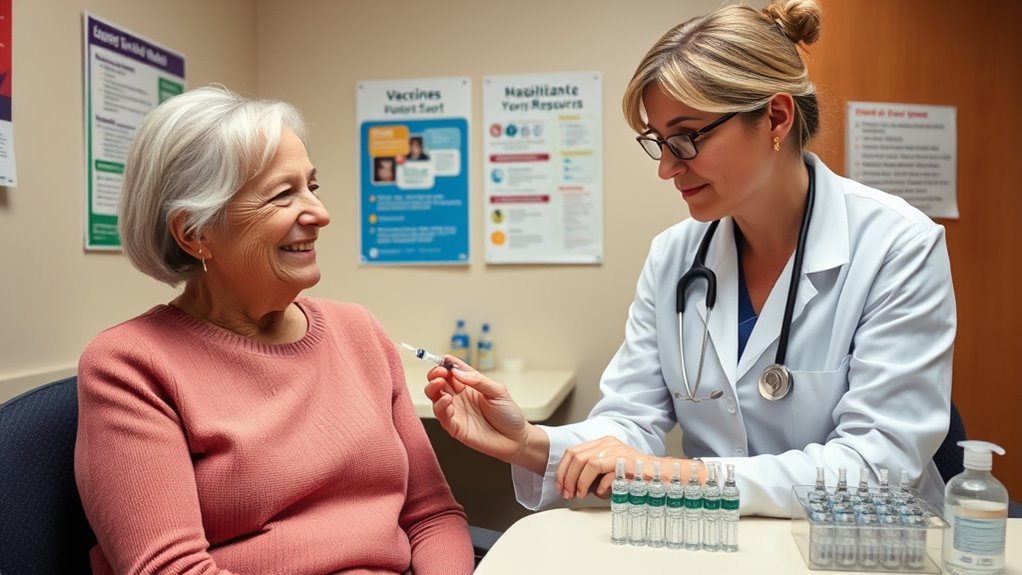Staying current with vaccinations is vital for your health as you age. Essential vaccines like flu, pneumonia, shingles, and Tdap help prevent serious illnesses and complications. Your healthcare provider can personalize your immunization plan based on your age, health status, and lifestyle. Regular updates and boosters protect you from preventable diseases and support your overall well-being. To learn more about the vaccines that can keep you safe, keep exploring the details below.
Key Takeaways
- Seniors should stay current with recommended vaccines like shingles, pneumococcal, flu, and Tdap to prevent serious illnesses.
- Age, health status, and medical history influence personalized vaccination schedules and booster needs.
- Vaccinations significantly reduce risks of infections, hospitalizations, and complications among older adults.
- Overcoming barriers such as vaccine hesitancy and access issues is essential for effective immunization.
- Maintaining accurate immunization records and consulting healthcare providers ensure timely boosters and complete protection.
Why Vaccinations Are Essential for Older Adults

As you age, your immune system naturally weakens, making it harder to fight off infections. That’s why vaccines are crucial for older adults—they help prevent serious infections that can lead to hospitalization or death.
As you age, vaccines help protect against serious infections and health complications.
Due to immune decline, your body’s defenses aren’t as strong as they once were, so staying current with immunizations is essential. Many seniors have outdated or missed childhood vaccines, which leaves gaps in protection.
Following recommendations for adult vaccinations can considerably reduce your risk of complications from preventable diseases. Each immunization works to boost your immune response, helping you fight off illnesses more effectively.
Ultimately, vaccines are a key tool in maintaining your health and preventing severe health issues as you age.
Key Vaccines Recommended for Seniors

To protect your health as you age, it’s important to stay current on several key vaccines recommended for seniors.
The CDC recommends that older adults receive the shingles vaccine (Shingrix), which can cut shingles risk and severity by about 50%. Immunization efficacy has been supported by numerous studies demonstrating significant health benefits.
The pneumococcal vaccine is essential for preventing pneumonia and related complications, usually given as a one-time shot with boosters after five years if needed. Automation in healthcare has improved the efficiency and accessibility of vaccination programs, making it easier for seniors to stay protected and receive timely immunizations. Moreover, ongoing advancements in AI security are helping healthcare systems identify at-risk populations and prioritize immunization outreach efforts.
The annual flu vaccine is also indispensable, especially for those 65 and older, to guard against seasonal flu and its serious complications.
Additionally, Tdap vaccination helps prevent tetanus, diphtheria, and pertussis.
Staying up-to-date with these immunizations aligns with CDC recommendations and is critical for preventing vaccine-preventable diseases in older adults.
Research supports the predictive validity of these vaccines in reducing disease incidence among seniors.
Advancements in machine learning algorithms are also being utilized to enhance public health strategies, including immunization outreach and monitoring.
Regular consultations with your healthcare provider ensure you’re protected.
How Age and Health Status Influence Vaccination Needs

Your age and overall health considerably influence which vaccines you need and how effective they’ll be. As you age, your immune system undergoes an age-related decline, reducing your immune response to certain vaccines. Incorporating immunosenescence into your vaccination plan can help optimize protection. If you have chronic conditions or compromised immunity, you might need higher-dose vaccines or additional doses to achieve protection. Your vaccination schedule will be tailored based on medical conditions, prior vaccinations, and personal factors like travel or lifestyle. These factors help determine the best timing and type of vaccines for you. For example, older adults with medical conditions may require specific vaccines sooner or in higher doses. Understanding how age and health status impact your vaccination needs ensures you get the most effective protection against preventable diseases. Recognizing immune system changes associated with aging can further refine your vaccination strategy and improve outcomes. Additionally, advances in AI-powered medical tools are increasingly assisting healthcare providers in personalizing vaccination plans for seniors. Moreover, staying informed about relationship health and emotional well-being can indirectly support overall health, which can influence immune response.
Details About the Flu and Pneumococcal Vaccines

Getting the flu shot yearly can markedly reduce your risk of serious illness, though its effectiveness varies each season. The pneumococcal vaccine is essential for preventing pneumonia, with most seniors needing only one dose, while some may require boosters. Both vaccines play a key role in protecting your health and preventing dangerous complications. Vaccination schedules should be discussed with your healthcare provider to ensure optimal timing and coverage. Regular screening is also important for early detection of breast cancer and maintaining overall health. Additionally, understanding the benefits of smart medical devices, such as remote monitoring tools, can help in managing chronic conditions more effectively.
Flu Vaccine Effectiveness
How effective is the flu vaccine in protecting seniors from illness? The flu vaccine’s effectiveness varies each year but generally helps reduce the risk of severe illness and complications for older adults.
Because the vaccine is updated annually to match circulating strains, getting your flu shot as part of your immunization schedule is essential each flu season.
While it may not prevent every case of the flu, the vaccine considerably lowers your chances of serious complications like pneumonia, sinus infections, and multi-organ failure. Health-conscious options and the availability of updated vaccines contribute to improved protection for seniors.
An annual flu vaccine is a crucial tool in maintaining senior health, especially when combined with other protective measures. Dynamic communication exercises for couples can also foster emotional resilience and support healthful interactions during challenging times.
Research also emphasizes the importance of selecting high-quality vaccines, which can enhance overall protection for seniors. Additionally, understanding spiritual energy and its influence on well-being can complement physical health practices, fostering a holistic approach to senior health.
Pneumococcal Vaccine Benefits
Since pneumonia causes around 60,000 deaths each year in the U.S., protecting yourself with the pneumococcal vaccine is essential. This vaccine helps prevent pneumococcal disease, which can lead to pneumonia, meningitis, and bloodstream infections, especially in older adults.
To maximize protection, consider these points:
- The pneumococcal vaccine is recommended as a one-time dose for elderly individuals, with a booster after five years if vaccinated earlier.
- Dual vaccination with PCV13 and PPSV23 enhances your immune system’s ability to fight bacteria and reduces pneumonia cases among seniors.
- Vaccination is especially crucial for those with underlying health conditions to prevent severe illness and maintain overall health. Understanding vaccine schedules can help ensure you receive the appropriate doses at the right times.
Additionally, understanding the importance of vaccination can motivate timely immunization to improve health outcomes. Incorporating self-sufficiency practices such as proper nutrition and health management can further support your immune health. Moreover, being aware of Retirement Planning principles can help you prepare financially for healthcare needs that may arise from illnesses.
Furthermore, staying informed about vaccine efficacy can help you make better decisions regarding your health and booster timing.
The Importance of the Shingles Vaccine

Why is the shingles vaccine so important for seniors? Because it offers shingles prevention, reducing your risk by about 90% in adults age 50 and older.
The shingles vaccine, like Shingrix, helps protect against the reactivation of the varicella-zoster virus, which stays dormant after chickenpox and can reactivate later in life. Recognizing angel number soulmate signs can also enhance your understanding of meaningful connections, including health-related decisions.
For those age 60 and older, vaccination is strongly recommended, even if you’ve had shingles before. Additionally, staying informed about dream recall techniques can support your overall health awareness and proactive care.
The vaccine is given as a two-dose series, which markedly lowers your chances of developing shingles and painful complications like postherpetic neuralgia, a condition that can cause lasting pain.
Strengthening your immune system through vaccination is a key step in safeguarding your health as you age.
In addition, maintaining a growth mindset toward health can motivate you to stay proactive about preventive measures like vaccination.
Being aware of your home furnishings, such as heated mattress pads, can also contribute to overall comfort and well-being during recovery or illness.
Tdap and Other Vaccines for Adult Protection

Getting your Tdap booster is key to staying protected against pertussis and preventing its spread, especially if you haven’t had it in the past 10 years.
For those 65 and older, a booster helps safeguard not only you but also vulnerable populations like infants.
Besides Tdap, vaccines like flu, pneumococcal, and shingles play essential roles in keeping you healthy as you age.
Tdap Booster Importance
Have you updated your Tdap vaccination in the last decade? Maintaining a Tdap booster is essential for adults, especially seniors, to sustain immunity against tetanus, diphtheria, and pertussis. Without regular boosters, your protection diminishes, increasing the risk of illness and transmission.
Consider these key points:
- The Tdap booster is recommended every 10 years to ensure continued protection.
- Adults over 65 who haven’t received Tdap should get a dose to prevent pertussis, which can be severe in seniors.
- Healthcare workers and those in close contact with newborns must stay current to reduce the risk of pertussis outbreaks.
Staying up-to-date with your Tdap vaccination helps safeguard your health and reduces the risk of spreading these preventable diseases.
Additional Adult Vaccines
Considering the range of health risks you face as an adult, staying current with vaccines beyond Tdap is essential for complete protection. While Tdap helps guard against tetanus, diphtheria, and pertussis, additional adult vaccines enhance your immunity against other serious diseases.
The CDC recommends a Tdap booster every 10 years to maintain immunity, especially during wound care or close contact with vulnerable populations.
Adults over 65 should receive a Tdap booster without the pertussis component if they haven’t had one.
Besides Tdap, vaccines like hepatitis B and HPV are also recommended based on your age, health, and risk factors, as part of your preventive care and vaccination schedule.
Staying updated helps protect your health and supports community immunity.
Addressing Barriers and Ensuring Safe Vaccination Experiences

Addressing barriers and guaranteeing safe vaccination experiences for seniors require targeted strategies that overcome common obstacles such as mobility challenges, misinformation, and infrequent healthcare visits.
To improve senior access, consider these approaches:
- Provide transportation assistance and flexible scheduling to reduce logistical vaccination barriers.
- Implement safety measures like infection prevention protocols, social distancing, and mask-wearing to ensure a safe environment.
- Address vaccine hesitancy through clear communication and targeted education, and promote co-administration of vaccines to streamline the process.
Staying Up-to-Date: Tracking and Maintaining Immunizations

To make certain seniors stay protected against preventable diseases, maintaining their immunization record is vital. Keeping these records current ensures you receive timely booster doses and prevents unnecessary repeat vaccinations.
Maintaining up-to-date immunization records helps seniors stay protected and avoid unnecessary vaccinations.
Many states offer adult immunization registries, making it easier to track vaccination histories accurately.
Regularly reviewing vaccination status with your healthcare provider helps identify any gaps and updates needed for vaccines like flu, pneumococcal, and shingles.
Blood tests can verify immunity levels when records are incomplete or unavailable.
Staying up-to-date with immunizations reduces your risk of severe illness from vaccine-preventable diseases.
By maintaining immunizations, you strengthen your defenses and stay healthier as you age.
Consistent tracking and review are key to ongoing immunity and peace of mind.
Resources and Support for Senior Vaccination Efforts

A variety of resources and support systems are available to help seniors stay on top of their vaccination schedules. These vaccination resources include official CDC guidelines, which provide detailed immunization recommendations, and vaccine education materials to inform seniors and caregivers.
You can also access tools like immunization records and registries that track your senior immunizations, ensuring timely updates. Additionally, community outreach programs and public health campaigns focus on improving vaccination rates through accessible information and convenient services.
Support services such as online platforms from trusted sources like the Mayo Clinic help you understand immunization schedules and preventive care strategies. By leveraging these resources, you can stay informed, adhere to recommended immunizations, and protect your health through consistent vaccination efforts.
Frequently Asked Questions
What Vaccines Do You Need for Senior Year?
For your senior year, you need to stay protected with key vaccines. Make certain you get your annual flu shot to fight seasonal strains.
Consider the shingles vaccine to prevent shingles and nerve pain. If you’re 65 or older, get the pneumococcal vaccine to guard against pneumonia.
Verify your Tdap shot is up to date for tetanus, diphtheria, and pertussis. Keep COVID-19 vaccines current to stay safe and healthy.
What Are the Routine Vaccines for the Elderly?
Imagine stepping into a well-kept library, each book representing your health. For seniors, routine vaccines are key chapters.
You should get the annual flu shot to stay ahead of seasonal bugs, the shingles vaccine (Shingrix) to prevent painful outbreaks, and the pneumococcal vaccine for pneumonia protection.
Don’t forget the Tdap booster for tetanus and diphtheria.
Finally, the COVID-19 vaccine keeps your story current and safe.
Which Vaccine Should Be Given to Patients Older Than 65 Years?
You should guarantee that your patients over 65 receive key vaccines. These include the pneumococcal vaccines (PCV13 and PPSV23) to protect against pneumonia, the shingles vaccine (Shingrix) to reduce shingles risk, and the annual flu shot to prevent complications.
If they haven’t had it, give Tdap for tetanus, diphtheria, and pertussis.
Also, consider the RSV vaccine for those with underlying conditions to help prevent serious respiratory infections.
What Is the New Vaccine for Seniors?
You’re asking about the new vaccine for seniors, and it’s Shingrix. Did you know it reduces shingles risk by over 90%?
You should get it if you’re 50 or older, regardless of previous shingles or vaccines. It’s given in two doses, 2 to 6 months apart.
This vaccine offers longer-lasting protection and is especially effective for older adults, helping prevent painful shingles outbreaks and complications.
Conclusion
Did you know that getting vaccinated can reduce your risk of serious illness by up to 80%? As a senior, staying current with your immunizations protects not only your health but also those around you. Don’t overlook essential vaccines like flu, pneumonia, and shingles—they’re key to maintaining your well-being. Take charge of your health today by discussing your vaccination needs with your healthcare provider and staying up-to-date for a healthier, safer future.









